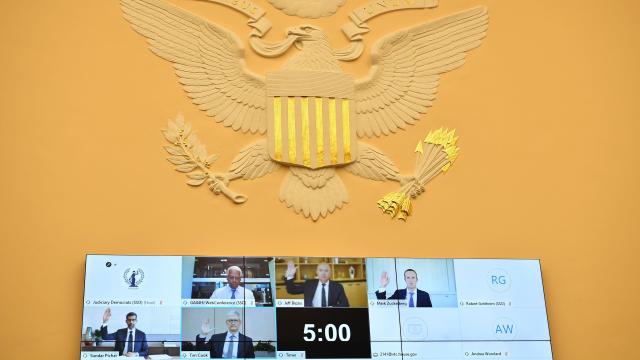This week, Bloomberg reported that a bipartisan group of lawmakers are inching closer to another big plan to break up big tech. But unlike grandiloquent calls for Meta to divest Instagram or for Google to divest Chrome, this new legislation would force both companies to divest the heart of their money-making machinery: their ads business.
Citing two people familiar with the forthcoming bill, Bloomberg reports that the bill would bar any company with more than $US20 ($28) billion in digital ad revenue from owning the tech needed to both buy ads and sell ads as well as the online marketplace where those transactions happen — digital vertical integration, in other words. For a company like Google, which does all three of those things, is valued at $US1.6 ($2) trillion, and earns more than $US20 ($28) billion in a single quarter, that would spell trouble. The bill’s impending appearance on the Senate floor was first leaked in January. Utah Republican Senator Mike Lee is reportedly spearheading the legislation.
That explanation might sound like a bit of word salad, but it’s not too complicated. In a brief nutshell: when a site like CNN dot com sells ad space to advertisers on the internet, it uses a bevvy of tiny tech tools to help those transactions happen — and the advertisers buying that space do the same. These players typically come head to head in what’s known as an ad exchange, where CNN’s tools announce the ad space is up for auction, and where advertisers use their tools to put in their bids. If Walmart’s tech wins the bid, then bam, you’re gonna see an ad for Walmart on your CNN story.
Right now, Facebook, Google and Amazon — the so-called “triopoly” in the digital ad world — rake in more than 60% of the dollars spent on digital ads every year, which topped $US211 ($293) billion last year alone. They’re able to pull in this kind of cash, in part, because they own every side of the market that they’re in. Amazon’s platform is the most popular place where American people shop online; Google has the world’s most popular search engine; and Meta’s social networks are the most popular of their kind around the world. If an advertiser wants to reach any of these companies’ users, they need to use each companies’ proprietary platforms to do it — even if they don’t want to.
When talking about a Google/DoubleClick break-up, the ways the products come together can be extremely confusing. I created a diagram explaining the Google display advertising stack (with footnotes!): pic.twitter.com/oHmosXaMcJ
— Ari Paparo (@aripap) March 18, 2019
When advertisers are strongarmed into using these tools, it means the other side of the marketplace — the apps and sites with ad space up for sale — are being strongarmed, too. App developers are stuck using tools like Meta’s Audience Network to find someone willing to pay for their space, and websites are stuck using Google’s Doubleclick For Publishers. When accused of being monopolies in front of lawmakers before, these companies regularly point out that the online market is crowded and competitive. It is. A report from this week found close to 10,000 digital ad players operating in the US this year.
But that’s not the point; as long as they have massive user bases, they’re also going to have massive advertiser bases paying massive bucks. Smaller companies are obligated to use the big guy’s tech in order to make any money at all, forking over a chunk of their profits to said big guy for the privilege.
When we talk about Google earning close to $US55 ($76) billion from its ads business in a single quarter, it’s not only from running ads on YouTube, or search, or any other individual Google-branded property. There’s also a sizable percentage that’s coming from countless news sites and recipe blogs that use Google’s digital advertising architecture — that’s why you see a standardised ad format across so many sites — and pay dearly to reach the captive advertisers who buy only through Google.
If Lee’s bill goes anywhere, those sites and blogs likely won’t look any different to you — they’re still gonna be showing the news, showing you sweets, and showing you ad after ad after ad. It just won’t be Google’s call to make anymore.
